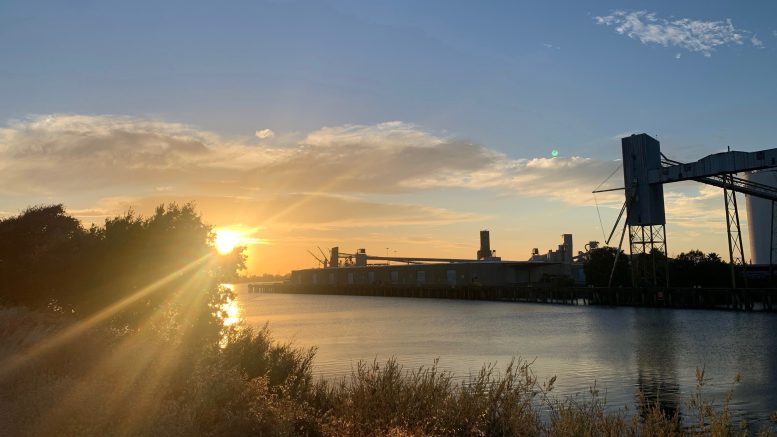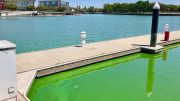By Dan Bacher
The struggle by tribes, environmental organizations, fishing groups and California residents to stop construction of the controversial Delta Conveyance Project, or Delta Tunnel, just heated up with the submission of a formal statement to the State Water Resources Control Board that highlights the “fundamental flaws” in the process.
The Delta Tribal Environmental Coalition, or DTEC, represented by the Environmental Justice Law and Advocacy Clinic at Yale Law School – along with the California Indian Environmental Alliance, San Francisco Baykeeper and Golden State Salmon Association – put forward the statement that claims to expose the flaws of the hearings concerning petitions submitted by the Department of Water Resources in February 2024. DWR had asked the State Water Board to modify water rights permits issued back in 1972, and change them in a way that would allow DWR to use them now to construct and operate the Delta Tunnel.
“In August, DWR also quietly added a request to extend the construction deadline for water storage and conveyance facilities under those permits by fifty-five years, from 2000 to 2055,” the Delta Tribal Environmental Coalition said in a statement. “The permits DWR is requesting to use for [the tunnel] expired decades ago and cannot be resurrected. The group calls on the State Water Board to hold DWR to the same policies and processes as other water users, requiring them to submit an application for a new water right – allowing the public to provide comments and the State Water Board to sufficiently analyze whether there is sufficient water available for this unprecedented water export project.”
The Delta Tunnel is a proposed 40-foot-wide underground conveyor with the capacity to siphon 6,000 cubic feet per second of water—the equivalent of roughly 245 Olympic swimming pools every hour—from the Sacramento River in the North Delta and send it directly to corporate agribusiness water users in the San Joaquin Valley.
The construction of the Delta Tunnel will only hasten the extinction of Central Valley salmon and steelhead and imperiled Delta fish species, according to scientists and fish advocates.
“Meanwhile, the State Water Board’s continued delay in updating water quality standards is worsening conditions in the Bay-Delta,” the DTEC continued in its public statement. “The tunnel would reduce flows to even more dangerously low levels, adding another chapter to the state’s history of trammeling on the rights of Delta Tribes, overlooking the interests of disadvantaged communities, and sacrificing the ecological integrity of the Bay-Delta for the profits of Big Ag.”
The project comes at a time when imperiled Central Valley salmon populations and Delta smelt, longfin smelt and other fish species have collapsed, due to massive water exports to corporate agribusiness and Southern California water agencies, combined with the impacts of toxics, pollution and invasive species. No Delta smelt – once the most abundant fish species in the Sacramento-San Joaquin River Delta – have been caught for six years in the California Department of Fish and Wildlife’s Fall Midwater Trawl Survey.
In addition, a weekly survey by the US Fish and Wildlife Service targeting Delta smelt caught only one smelt this summer.
“A late April IEP juvenile fish survey (the 20-mm Survey) caught several juvenile Delta smelt in the same area,” noted scientist Tom Cannon in his blog on the California Sportfishing Protection Alliance website: calsport.org
The State Water Board remains under investigation by the U.S. Environmental Protection Agency, or EPA, for discriminating against Delta tribes and disadvantaged communities in its mismanagement of Bay-Delta water quality controls.
The coalition tribes, environmental groups and fish-protectors urges the State Water Board to “reject DWR’s petitions and require the completion of the Bay-Delta Plan and the conclusion of EPA’s investigations into Board discrimination before taking further action.”
A broad group of Delta cities and counties and other stakeholders have also submitted statements to the State Water Board expressing similar concerns with the Delta Tunnel proceedings.
Representatives of the tribes commented that the DWR’s continuing campaign to build the Delta Tunnel comes at the expense of Native American rights, fish populations and the public trust.
Gary Mulcahy, Government Liaison for the Winnemem Wintu Tribe said, “As the tribe has stated before, the Department of Water Resources attempt to extend expired water rights permits by a significant 55 years is unlawful. DWR has wasted public money now for 24 years on the basis of an expired permit and a version of a zombie project rejected by the public since 1982. DWR can no longer skirt the law and must go through the actual process of filing for a new water right permit.”
Malissa Tayaba, Vice Chair for the Shingle Springs Band of Miwok Indians, stated,
“While tribes continue to be impacted by unhealthy rivers and watersheds, the Department of Water Resources is trying to rush forward with a tunnel project that would divert more water out of our rivers and Delta eco-cultural systems. We need a transparent and fair process that prioritizes our tribes, our rivers, and cultural landscapes. We should not allow DWR to play by a different set of rules that further harms us.”
Naji Thompson, certified student attorney with the Yale Environmental Justice Law and Advocacy Clinic, said that the Board must first resolve “critical threshold questions about its jurisdiction and the rights and interests of Bay-Delta Tribes and communities.”
“It is essential that the Board rejects DWR’s attempts to sidestep procedural safeguards, which are designed to protect the voices of those who will be forced to live with the long-term impacts of the DCP’s construction and operations for generations to come,” Thompson argued.
Gloria Alonso Cruz, Environmental Justice Advocacy Coordinator for Little Manila Rising, agreed.
“The approval of DWR’s petition will force historically marginalized Bay-Delta communities to continue to endure generations of ecosystem disruption, an unjustifiable act, and proceeds to neglect the voices of Tribal and marginalized communities,” said Cruz. “The State Water Board has the authority to hold DWR accountable and prioritize protections for communities and the Bay-Delta environment.”
The tribal statement was submitted during the second year in a row of a complete closure of recreational and commercial salmon fishing on the ocean and recreational salmon fishing in all California rivers, due to the collapse of Sacramento River and Klamath River fall-run Chinook salmon populations.
“Extending water permits for 55 years isn’t a ‘minor change’—it’s a major blow to California’s already struggling salmon populations,” emphasized Scott Artis, Executive Director for the Golden State Salmon Association. “The Delta Conveyance Project will devastate the fishing industry and Bay-Delta watershed that communities and tens of thousands of people and businesses rely on, all while bending the rules for big water interests.”
Cintia Cortez, Policy Manager for Restore the Delta, echoed similar concerns.
“DWR is requesting the Board bypass proper review to extend expired permits without standing,” reported Cortez. “Yet, it’s been two years since Delta communities, that continue to live with degraded waterways and toxic algae, requested relief from the state. By continuing this process, the Board prioritizes serving special interests and gives DWR cover to please the Governor.”
Eric Buescher, Managing Attorney for the San Francisco Bay Keeper, said laws have to apply to everyone, including DWR under the Newsom administration.
“The State Board’s processes matter,” Buescher concluded. “How the Board handles this water rights proceeding will have impacts on the ecosystems and people who depend on a healthy San Francisco Bay, Delta, and watershed. The State Board needs to act fairly, justly, and quickly to address the crisis in the Delta before it considers whether to grant DWR the authority to further degrade conditions throughout the watershed over the next five decades.”






Last seen in 1982. As a ballot measure so now the commissars are just skipping that step so screw the public!